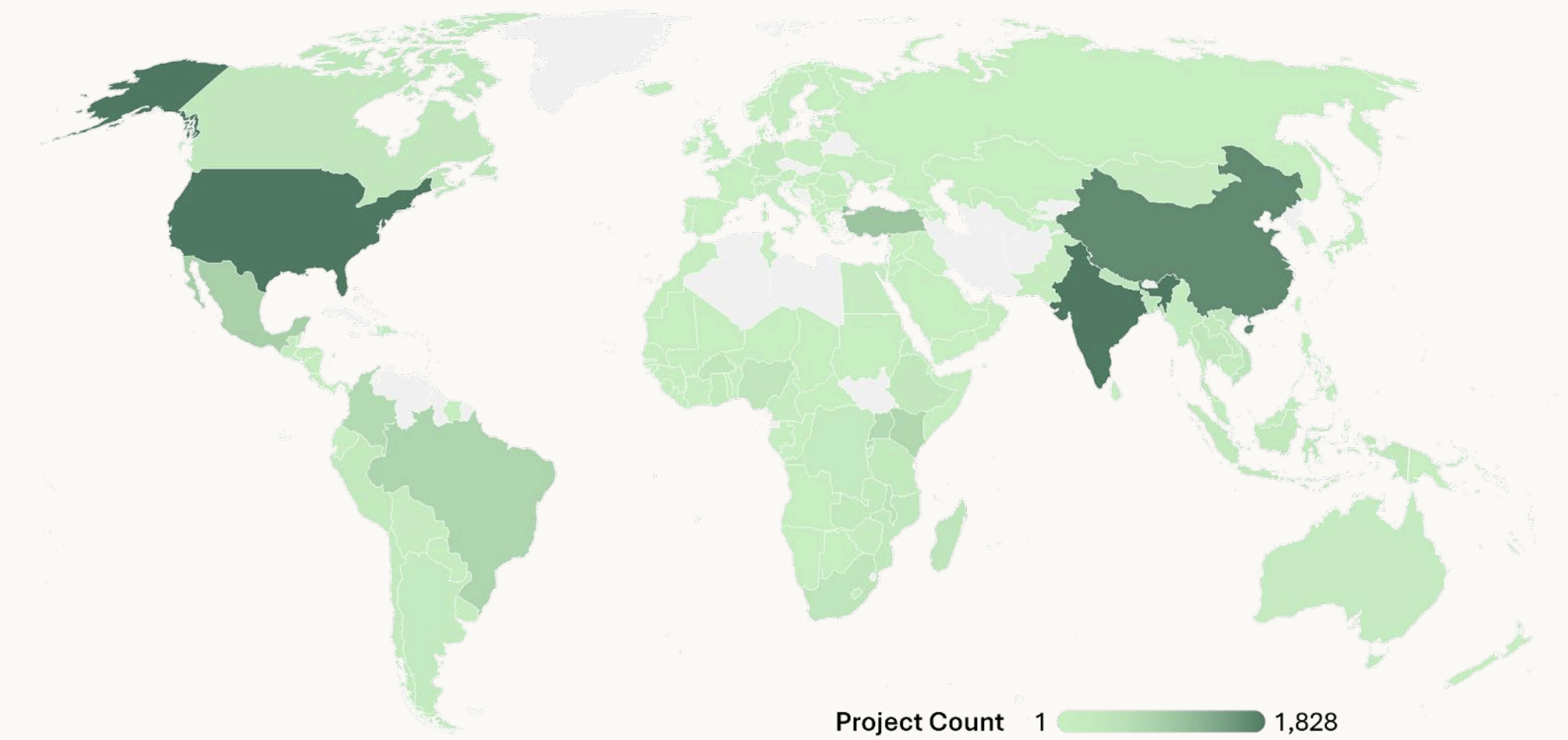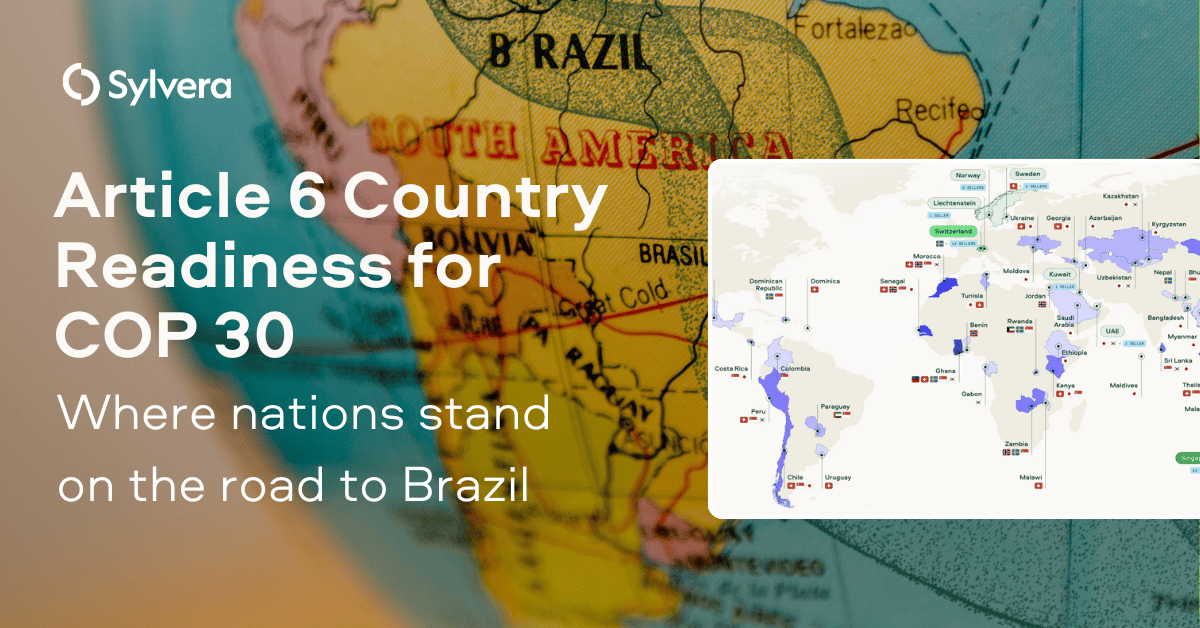"A lo largo de los años hemos invertido mucho en nuestro equipo de datos de campo, centrándonos en la elaboración de calificaciones fiables. Si bien esto garantiza la precisión de nuestras valoraciones, no permite la escala a través de los miles de proyectos que los compradores están considerando."
Para más información sobre las tendencias en la adquisición de créditos de carbono, lea nuestro artículo"Key Takeaways for 2025". Compartimos cinco consejos basados en datos para mejorar su estrategia de adquisición.

Una cosa más: los clientes de Connect to Supply también tienen acceso al resto de herramientas de Sylvera. Esto significa que puede ver fácilmente las calificaciones de los proyectos y evaluar los puntos fuertes de cada uno de ellos, obtener créditos de carbono de calidad e incluso supervisar la actividad del proyecto (sobre todo si ha invertido en la fase previa a la emisión).
Reserve una demostración gratuita de Sylvera para ver en acción las funciones de adquisición y elaboración de informes de nuestra plataforma.
La Convención Marco de las Naciones Unidas sobre el Cambio Climático (CMNUCC) se estableció en 1992 y ahora cuenta con 198 partes, 195 de las cuales adoptaron el Acuerdo de París en 2015.
En noviembre de 2025, se celebrará en Belém, Brasil, la 30.ª Conferencia de las Naciones Unidas sobre el Cambio Climático (CMNUCC), también conocida como COP 30. La conferencia se centrará en la mitigación del cambio climático y en el progreso de cada nación hacia los estándares del Acuerdo de París.
En este artículo, analizamos cuál de estos países está más preparado para la puesta en práctica del Artículo 6.
El camino hacia la COP 30: un momento crucial para los mercados de carbono
La COP 30 de la CMNUCC se celebrará en Brasil en noviembre de 2025, y los líderes gubernamentales de toda la comunidad internacional se enfrentan a un momento crucial para la aplicación del Artículo 6 .
Tras los acuerdos históricos alcanzados en la COP 29 de Bakú, que finalizaron todos los componentes restantes del Artículo 6, los países ahora cuentan con la claridad política y técnica necesaria para poner en marcha los mercados internacionales de carbono en el marco del Acuerdo de París.
A medida que los gobiernos de todo el mundo planifican sus objetivos climáticos y la necesidad de mecanismos de financiación innovadores, el Artículo 6 representa una gran oportunidad para acelerar la acción climática. Sin embargo, el éxito depende de la preparación de los países anfitriones, y los avances actuales revelan un panorama desigual con importantes deficiencias.
La celebración de la COP 30 en Brasil otorga una importancia particular a esta evaluación de preparación. Como país anfitrión con vastos recursos forestales y potencial de energía renovable, la trayectoria de Brasil en relación con el Artículo 6 puede influir en el impulso global. El simbolismo de lograr una puesta en práctica sustancial del Artículo 6 para cuando la conferencia se inaugure en la región amazónica el 10 de noviembre podría constituir una poderosa validación para la cooperación internacional en materia de carbono.
Estado actual de preparación mundial para el artículo 6
¿Qué países han avanzado más en la puesta en práctica del Artículo 6? A continuación, destacamos los países líderes, así como las áreas en las que muchos gobiernos estatales se quedan cortos.
El grupo de cabeza: Países que marcan la pauta
Un pequeño grupo de países se ha convertido en líder en preparación para el Artículo 6, demostrando cómo es en la práctica una preparación exhaustiva.
Ghana destaca quizás como el país anfitrión más avanzado, ya que ha desarrollado un marco nacional detallado que vincula explícitamente las actividades del artículo 6 a las medidas condicionales de la NDC, al tiempo que establece listas claras de actividades positivas y negativas. El enfoque de Ghana incluye mecanismos estructurados de reparto de beneficios y ya ha emitido múltiples Cartas de Autorización en virtud de su Acuerdo de Aplicación con Suiza.
Camboya se unió recientemente al nivel de liderazgo al presentar su Informe Inicial a la CMNUCC en abril de 2025, describiendo claramente sus acuerdos institucionales con el Ministerio de Medio Ambiente como autoridad competente designada. El manual operativo del país establece procesos exhaustivos en virtud del artículo 6 e incluye disposiciones innovadoras sobre el reparto de beneficios, como la reserva de hasta el 10% de los resultados de mitigación autorizados para uso nacional.
Tailandia ha alcanzado un tipo diferente de liderazgo a través del éxito operativo, convirtiéndose en el primer país en completar transacciones reales de ITMO. En diciembre de 2023, Tailandia transfirió 1.916 ITMO a Suiza procedentes de su programa de autobuses eléctricos de Bangkok, el primer intercambio de ITMO del mundo, al que siguieron otros 29.222 ITMO un año después. Esta aplicación en el mundo real demuestra la viabilidad práctica de los mecanismos del artículo 6.
Kenia se ha distinguido por sus regulaciones progresistas de reparto de beneficios, que exigen que los proyectos de carbono terrestres destinen al menos el 40% de las ganancias netas a los beneficiarios de la comunidad, mientras que los proyectos no terrestres deben destinar el 25%. Este marco proporciona sólidas garantías y previsibilidad para las comunidades locales.

El Medio Comprometido: Países que toman impulso
Un grupo más amplio de aproximadamente 30 países ha firmado acuerdos bilaterales o memorandos de entendimiento, lo que indica una seria intención de participar en el Artículo 6. Algunos ejemplos notables son:
- Ruanda y Madagascar, que han emitido Cartas de Autorización unilaterales para proyectos de carbono certificados según normas independientes.
- Uganda, Ghana, Myanmar y Bangladesh, que han aprobado múltiples actividades del Mecanismo para un Desarrollo Limpio para la transición al Mecanismo de Acreditación del Acuerdo de París.
- Indonesia, Colombia y Chile, que han integrado la aceptación de créditos de carbono en sus sistemas nacionales de fijación de precios del carbono.
El reto: lagunas generalizadas en la preparación
A pesar de que más de 100 países han manifestado su interés en sus Contribuciones Determinadas a Nivel Nacional, la preparación real sigue siendo limitada. Sólo nueve países han presentado informes iniciales a la Plataforma Centralizada de Contabilidad y Presentación de Informes (CARP) de la CMNUCC, y muchas naciones carecen de los mecanismos institucionales fundamentales necesarios para participar en virtud del artículo 6.
Entre las principales carencias en materia de preparación cabe citar las siguientes:
Debilidades institucionales: Muchos países carecen de autoridades competentes designadas o de mecanismos claros de coordinación entre los ministerios pertinentes. Sin estos elementos fundacionales, los países no pueden expedir cartas de autorización ni gestionar eficazmente las transacciones internacionales.
Deficiencias en la infraestructura : Muchos países potenciales carecen de sistemas sólidos de monitoreo, reporte y verificación (MRV) que cumplan con los requisitos del Acuerdo de París. Esto genera importantes obstáculos para la integridad ambiental y la confianza de los compradores.
Incertidumbre regulatoria : Si bien al menos seis países han publicado marcos formales del Artículo 6, muchos otros operan sin fundamentos jurídicos claros para la participación en el mercado internacional de carbono .
Limitaciones de capacidad: Las capacidades técnicas para aplicar los ajustes correspondientes, gestionar los registros y cumplir las obligaciones del Marco de Transparencia Reforzada plantean retos constantes, en particular para los países menos desarrollados.
Descargue el informe completo "Preparación del país anfitrión para el Artículo 6: Aspectos clave para impulsar la demanda" para obtener evaluaciones detalladas de los países, marcos de implementación y orientación práctica para acelerar su proceso de implementación del Artículo 6 antes de la COP 30.

El imperativo de la COP 30: Lo que los países deben lograr
Los países deben realizar esfuerzos conjuntos para prepararse para la COP 30. También deben aprovechar las oportunidades estratégicas. Analizamos estos aspectos a continuación:
Prioridades inmediatas
Los países que se tomen en serio la participación en el Artículo 6 deben centrarse en los elementos básicos de preparación:
- Presentar informes iniciales: Los más de 90 países interesados restantes deben demostrar el cumplimiento de los requisitos de participación mediante presentaciones formales ante la CMNUCC.
- Establecer marcos institucionales: La designación de autoridades competentes y la definición de funciones claras en todos los organismos públicos son esenciales para la preparación operativa.
- Desarrollar marcos nacionales: Los países deben traducir los requisitos de la CMNUCC en normas y procesos aplicables a nivel nacional, siguiendo los ejemplos de Ghana, Camboya y otros países.
- Crear capacidad técnica: Invertir en sistemas de supervisión, notificación y verificación acordes con los requisitos del Acuerdo de París.
Oportunidades estratégicas
La pasarela hacia la COP 30 presenta oportunidades para un posicionamiento más avanzado:
- Implementación piloto: Siguiendo el ejemplo de Tailandia, los países deben llevar a cabo actividades piloto para demostrar la capacidad operativa y adquirir experiencia práctica.
- Desarrollo de acuerdos bilaterales: Ampliación de la red actual de 30 acuerdos bilaterales para incluir más asociaciones entre compradores y vendedores.
- Integración con las políticas nacionales: Alineación de las actividades del artículo 6 con la legislación nacional sobre el clima, los sistemas de tarificación del carbono y las estrategias sectoriales.
- Participación de las partes interesadas: Conseguir el apoyo de las comunidades locales, la sociedad civil y los participantes del sector privado.
La mayoría rezagada: Intervenciones críticas necesarias
Para los países que aún se encuentran en las primeras fases de preparación, el calendario de la COP 30 exige medidas urgentes:
- Los Países Menos Adelantados de África y los Pequeños Estados Insulares en Desarrollo necesitan asistencia técnica específica y apoyo al desarrollo de capacidades
- Las principales economías emergentes con un potencial de mitigación significativo deben aclarar su posicionamiento en virtud del artículo 6 y sus planteamientos normativos
- Los países con abundantes soluciones climáticas naturales necesitan marcos para desbloquear la participación del sector forestal y del uso de la tierra.
El papel de Brasil como anfitrión de la COP 30
Como anfitrión de la COP 30, Brasil enfrenta presiones y oportunidades únicas para demostrar su liderazgo en el Artículo 6.
Los vastos recursos forestales del país, su potencial de energía renovable y su experiencia existente en el mercado de carbono lo posicionan como un posible ejemplo para una implementación eficaz.
La propia trayectoria de preparación de Brasil —incluidos los avances en materia de acuerdos institucionales, mecanismos de reparto de beneficios y protección de los derechos indígenas— probablemente influirá en la percepción mundial de la viabilidad del Artículo 6. Lamentablemente, el país ya ha sido criticado por su enfoque de la conferencia.
A principios de este año, se reveló que el gobierno de Brasil autorizó la construcción de una nueva autopista de cuatro carriles que atravesará miles de hectáreas de selva amazónica para facilitar el tráfico hacia la COP 30, que se espera que atraiga a 50.000 personas adicionales a Belém. (De hecho, la ciudad se está preparando para la afluencia de personas construyendo nuevos hoteles e incluso contratando cruceros).
El presidente brasileño afirma que la conferencia pondrá de manifiesto las necesidades del Amazonas, pero los críticos están preocupados por la deforestación y por cómo la carretera afectará a las comunidades locales y a la biodiversidad.
Si bien la construcción de la autopista es lamentable, aún esperamos que el gobierno estatal brasileño pueda demostrar un liderazgo efectivo en virtud del Artículo 6, dada su situación particular.
Libere el potencial de su país en virtud del artículo 6
Las semanas previas a la COP 30 representan una oportunidad crucial para que los países desarrollen su preparación en virtud del Artículo 6 y capturen la creciente demanda del mercado de carbono.
Ya sea usted funcionario estatal, organización no gubernamental dedicada al desarrollo de capacidades o parte interesada del sector privado, comprender las deficiencias actuales en materia de preparación y las mejores prácticas es esencial para la participación.
¿Busca una forma práctica de navegar por el riesgo del artículo 6? Utilice Sylvera para evaluar y contrastar los perfiles de riesgo de los proyectos de créditos de carbono en varios países. A continuación, aproveche nuestras calificaciones y clasificaciones previas a la emisión, líderes en el sector, para adquirir créditos de alta calidad que impulsen sus objetivos climáticos.
Solicite hoy mismo una demostración gratuita de Sylvera para saber cómo nuestra plataforma puede ayudar a su empresa a prosperar en el mercado de créditos de carbono.











